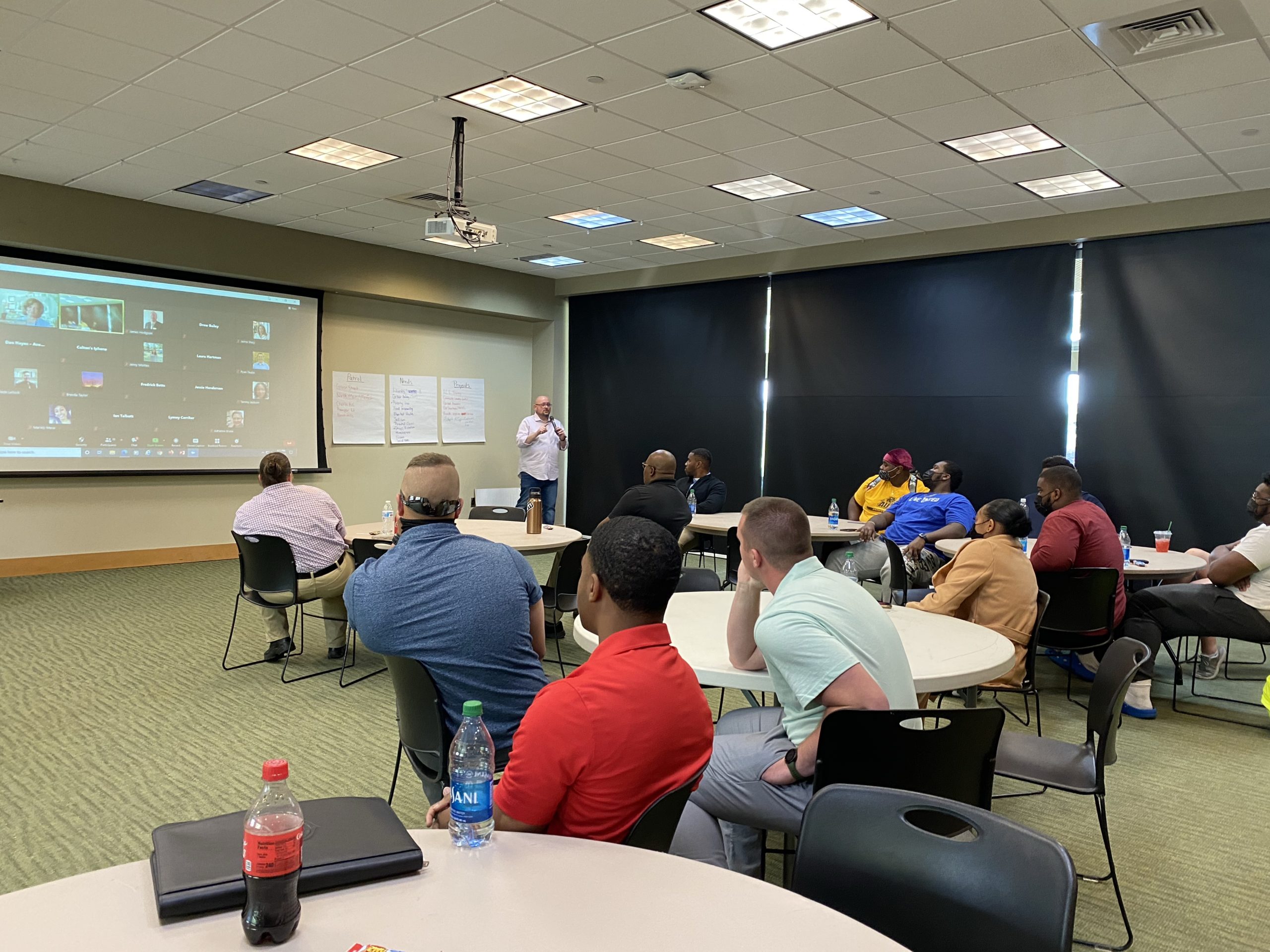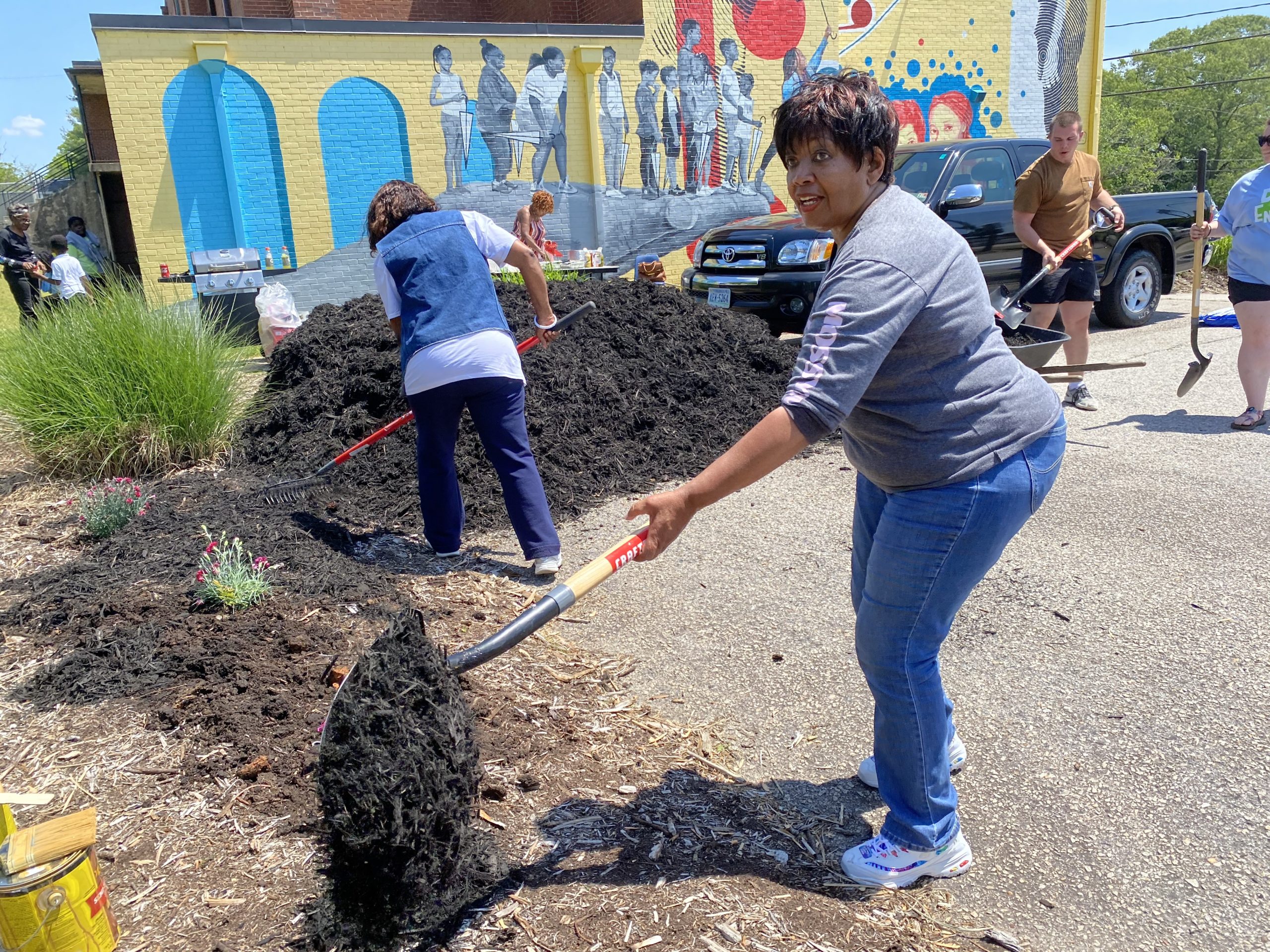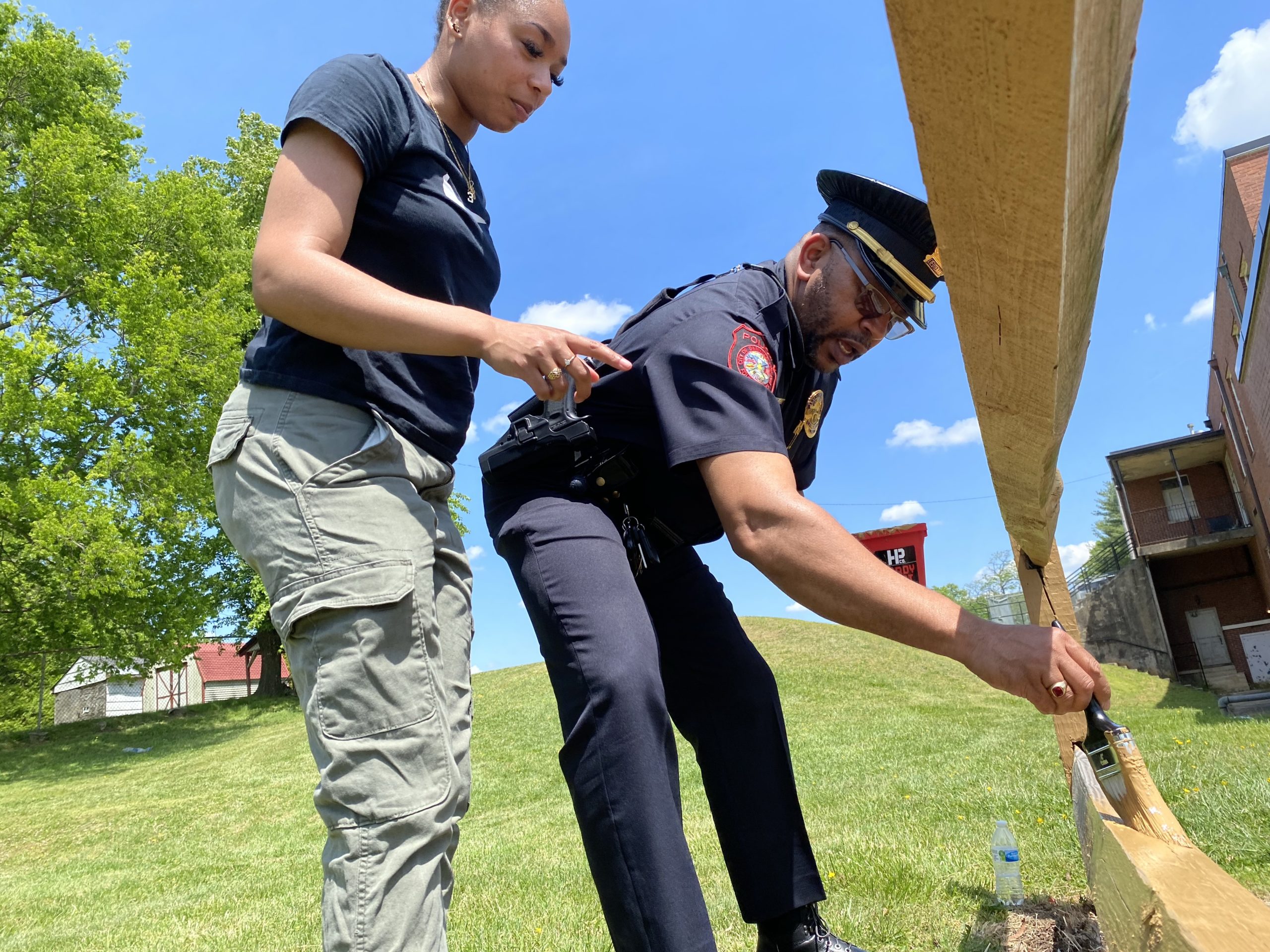Two TRUTH Talks were held recently at Averett University with conversations surrounding community policing and social injustice in Danville.
TRUTH Talks are defined as, “true racial understanding through honest talk,” and are hosted throughout the academic year by the Center for Community Engagement and Career Competitiveness (CCECC) at Averett.
Danville Police Department and Community Policing
 The first event was held virtually and in-person as space allowed on campus Tuesday, April 20, as a question and answer session between members of the Averett campus community and seven new officers with the Danville Police Department. The new officers are Bryanna McLaughlin, Cody Young, Kermit Clay, Michael Cagle ’20, Sheila Hughes, Tyquan Graves and Zaccheus Davis.
The first event was held virtually and in-person as space allowed on campus Tuesday, April 20, as a question and answer session between members of the Averett campus community and seven new officers with the Danville Police Department. The new officers are Bryanna McLaughlin, Cody Young, Kermit Clay, Michael Cagle ’20, Sheila Hughes, Tyquan Graves and Zaccheus Davis.
The April 20 meeting consisted of the officers being introduced to the community and talking about community policing. The officers also created three lists for needs, patrol and projects for the greater Danville area.
“I am continually impressed as to how community-oriented our Danville Police Department is under the leadership of Chief Booth,” CCECC Executive Director Dr. Billy Wooten said.
“The seven new officers with whom we held our workshop on community policing will be shining examples for their peers and, honestly, for the country. They emphasized a desire and a mission to be good listeners, be empathetic officers, and to integrate into the community by getting to know whom they serve – not just patrol their neighborhoods and enforce the law. Danville should be a benchmark for other cities to follow.”
Among the needs the officers named were inadequate laundry areas, car seat safety, the poverty line, food insecurity, mental health awareness, self-care classes, parental classes, drugs/alcoholism, homelessness, finance and special needs.
For the patrol list, officers listed the neighborhoods in Danville they knew, which led to creating the projects list. The list of projects included ACE Training and how to help children with special needs, a community laundry center, car seat awareness, expanding the adopt-a-cop program and collaborating with God’s Storehouse and PATHS.
During the final hour of their meeting, the officers introduced themselves to Averett and took questions.
“I want to be one of those officers to change the stigma,” McLaughlin said. “The badge will not define who I am. I am going to treat you with respect just as you will treat me with respect.”
Davis said he joined the police department to protect people.
“I don’t want to treat people as if I’m better than them. I want to treat everyone fairly. If I can do something, I want to do something,” Davis said.
The officers told those in attendance they have received training in answering calls related to domestic disturbances and specifically dealing with women in distress.
 One of the questions posed focused on a concern by Black students feeling as though they needed a white person in the car to prevent being pulled over.
One of the questions posed focused on a concern by Black students feeling as though they needed a white person in the car to prevent being pulled over.
“We’re not going to pull you over just because there’s all black people in the car. That’s beyond not right. If we’re pulling you over, it’s for a speeding or some other infraction. I am sorry you feel that way,” Hughes said.
Davis said before getting in the car as a child with his family, his father would share a stat that one in four Black men were going to jail.
“That’s a scary stat,” Davis said. “In a city like this where there’s community policing, I don’t think you have to worry about that. If you’re doing the right thing, if you get stopped, cooperate and listen. If you are stopped, there is a reason.”
Asked how Averett can be better partners with the police department, Graves said perception is a primary goal of community policing.
“One of the biggest things is if you see something, say something…Changing the perception, and what it is from where you come from, I promise you isn’t what you’ll find here,” Graves said.
The officers also addressed a possible financial quota on traffic stops. Clay said there were no quotas to meet on traffic stops, and a stop is based on citations and infractions.
Young humanized his response and said even he gets nervous seeing an officer behind him when driving.
“We’re not just looking to pull someone over. We have a lot going on whether it’s a mental health patient or something else,” Young said. “When we’re behind you on patrol, we’re not looking for something. I got nervous just the other week when [Clay] pulled up behind me.”
Averett freshman Ezekiel Williams asked how he could get more involved with the police force via volunteer work or internships as a student in criminal justice. Dr. Wooten noted there are three internship spots available through the CCECC for sociology/criminal justice students.
The meeting ended on a positive with Graves stating community policing gives them a chance to know the community even better than before.
 “[Community policing] gives us an opportunity to know the people, the community, the frequent flyers and having those conversations about what’s going on. Now people see [us] more often,” Graves said.
“[Community policing] gives us an opportunity to know the people, the community, the frequent flyers and having those conversations about what’s going on. Now people see [us] more often,” Graves said.
The officers came together again with Averett students and the CCECC on Wednesday, April 28, to help revitalize a park in the Camp Grove community at the corner of Bradley Road and North Main Street. Officers spread mulch, pulled weeds, painted fencing, worked on playground equipment and shared time with community members as well.
Longtime Danville Parks and Recreation Supervisor Judy Fallen for the Camp Grove Community said she was grateful for the help and support of the community and police.
“We are excited in the Camp Grove community about this wonderful event that’s taken place. We are so glad to see beautification going forth on the playground. We celebrate Dr. Wooten, Tia Yancey… and the rookie officers from the police department you see out here shoveling,” Fallen said. “Thank you and we are so happy.”
Social Injustice and the Danville Area
On Tuesday, April 27, the final TRUTH talk was held during the academic year.
Around 30 people listened as Shakeva Frazier ’20, Carl Lut Williams and Felice McWilliams shared their experiences with civil rights, and past and present social movements.
Dr. Slade Lellock, Averett assistant professor in sociology and criminal justice, said a group of students spent the semester looking back at social movements and the civil rights era by taking a deeper dive into speeches and local movements. Two of those events included a speech by Dr. Martin Luther King, Jr. at High Street Baptist Church in Danville on July 11, 1963, and the 1963 Bloody Monday events that also occurred in Danville.
Williams, a Danville native who was a child of the civil rights movement, said that roughly 170 years after the Dred Scott case was decided by the Supreme Court of the United States, there is still injustice and denied rights that have gone unchecked.
“My father was a civil rights and NAACP attorney. He was given a golden briefcase for his work to clear the cases of those who were illegally arrested during the civil rights movements,” Williams said.
As individuals were arrested for protesting peacefully in Danville, it became the job of Williams’ father to clear them in court.
“The idea that a human being has to struggle for your rights and freedoms in a system that is set to struggle for your rights and freedoms should be emotional to everyone,” Williams said. “It’s a system that for centuries has denied civil rights, not to mention human rights – or centuries of oppression, torture, rape, pillage and primarily discrimination of civil rights for much of its history up until today.”
Williams remarked he loved the work of King, and felt he brought a message that resonated with him.
“On the day he died, April 4, 1968, from my perspective it was the worst day of my life. The man I thought represented the great hope for freedom, justice and equality was killed with a shotgun. My optimism for America died with Martin Luther King,” Williams said.
McWilliams, who originally moved to Danville to spend more time with her grandchildren, said she never dreamed she would be so involved in the life of Danville after moving here, but “God had other plans.”
“The strength of the people in the city, especially in 1963 in Bloody Monday, people were strong and knew that God would see them through,” McWilliams said.
She read an excerpt from Dorothy Moore, who in 1963 was a student protestor in Danville.
Reading Moore’s own words, she described the summer of 1963 as ‘something else.’
“I will never forget how it felt to sit at a separate, small counter at Woolworth’s… or in the back of the bus when there were seats up front. The time came to let them know we were part of the city. I was 20 years old and home for the summer, I knew something had to be done to be recognized as people,” McWilliams said reading Moore’s recollection of the summer.
After reading the excerpt, McWilliams sung a song she wrote entitled, “Lift Each Other Up.”
Frazier, who is a Danville native and attends Bibleway Cathedral on Industrial Avenue, said Bishop Lawrence Campbell speaks often on the Civil Rights Movement.
Bishop Campbell helped to organize the protests that occurred in Danville in 1963 in addition to bringing Dr. King to Danville. Denied a room in the Howard Johnson for Dr. King, Campbell took him to nearby Greensboro, N.C. to stay.
“I do see Danville going somewhere and don’t want to pinpoint all the negativity. For me, the social injustice was behind me. I was born in 1980 and was able to sit in class with a white girl or Hispanic student. In a city where Confederate flags are flying, you learn to deal with it. I was saved in 2009, and I lived much differently before that,” Frazier said.
Frazier is a gang and youth prevention worker for the City of Danville, and said Danville Police Department Chief Scott Booth has a de-escalation plan in place to avoid what occurred in May 2020 to George Floyd in Minneapolis, who was killed by police. She said there is also a group panel of four community members to review how use of force is involved in arrests, and to give feedback on what they watch.
As for the actions of the police in Danville during the events of Bloody Monday, Frazier said Chief Booth made a public apology on behalf of the police department to Campbell and those involved in the civil rights movement a few years ago.
“We’re starting to see where some of this is working for good. Chief Booth made a public apology at Averett to Bishop Campbell and those who were involved in the civil rights movement. Bishop Campbell said it was the first time they had ever heard an apology,” Frazier said.
Frazier ended the TRUTH Talk by stating she is working to reach out to everyone impacted by social injustice.
“I don’t like bullies. In school, I would stand up for people that wouldn’t stand up for themselves,” Frazier said. “I will put my words where they need to be and pray for how they need to be used. I don’t see the same fury for whites who may have died. I know we still have a neighborhood watch among our community, because that’s how it had to be, but we’ve got to branch out. Social injustice goes both ways. If I see a white person going through the same thing, we need to be reaching out. That’s what stirring my fire right now is looking out to those who haven’t been reached out to, and then second reaching out to those who have been left out.”
